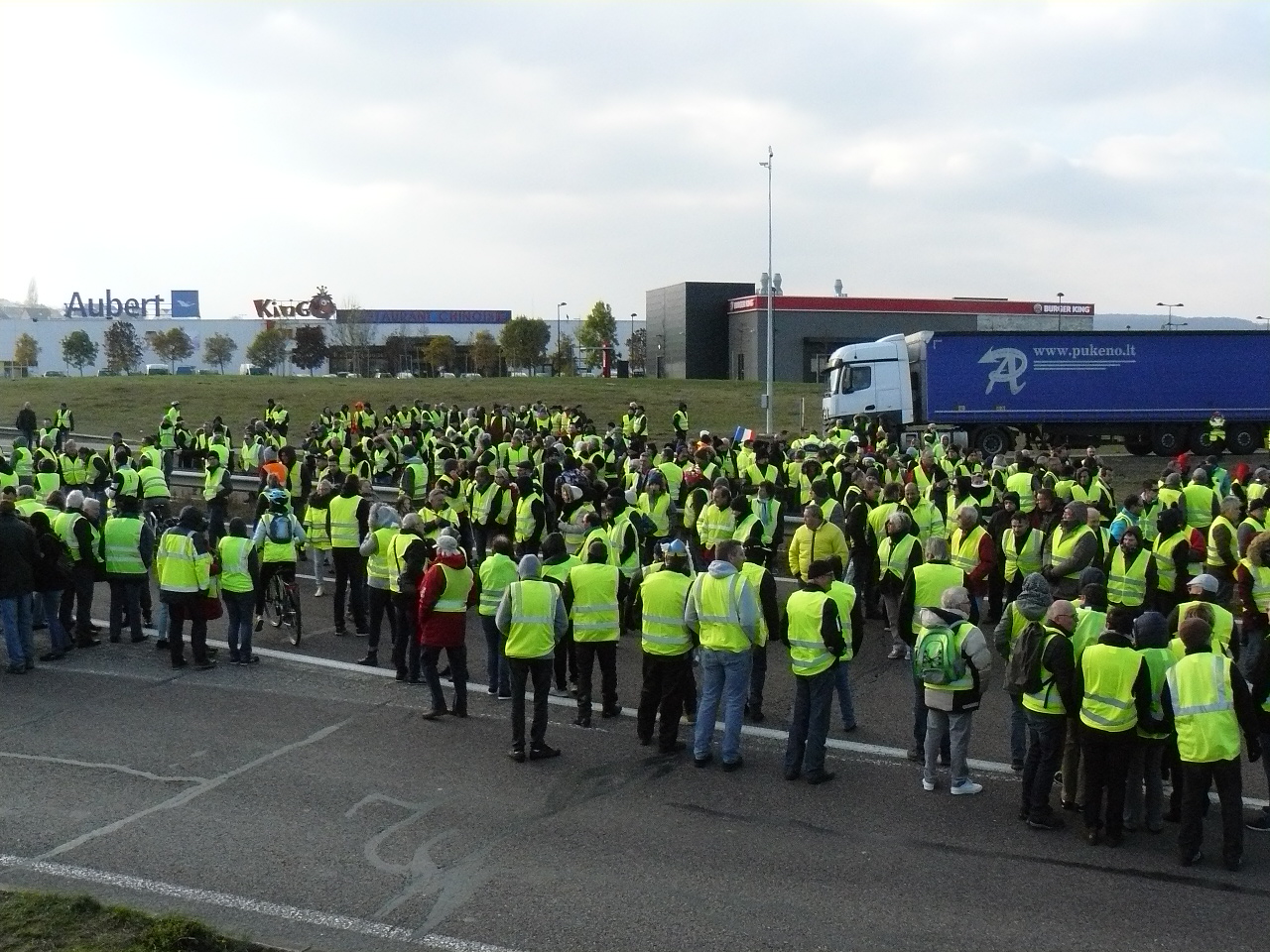22 November 2018
“It’s going to be a nightmare.”
New French Revolution?
By Richard Pooley

“Ça va être un cauchemar” my French neighbours said in unison. I was leaving their house having just watched France’s rugby team being beaten in the 86th minute by South Africa. Hugues was not in the best of moods but when he learned that I was flying back to the UK on Saturday 17 November, his lugubrious face registered genuine alarm. Had I not heard about the “gilets jaunes”, the fuel price protesters who, wearing yellow vests, would be bringing France to a halt on 17 November? I hadn’t. Martine, normally a warm and cheerful antidote to her husband, begged me not to drive to Limoges airport on that day. I wouldn’t get further on the 1 ½ hour journey than a roundabout 20 minutes north of our village. And several motorway exits would be blocked. I told them that I knew of a route which would avoid that particular roundabout and that I was taking a train for much of the journey anyway. Even so, they said, these protests always become violent and out of control. It really was going to be a nightmare. Much better if I got to Limoges the night before, stayed in a hotel and found a taxi driver to take me along the back roads to the airport the next morning.
I got similar advice the next day from a British couple who had come over for lunch before joining me at an Armistice Day concert in our village church (performed by a superbly-talented, all-female string quartet from the UK’s Royal College of Music, but that’s another story). They have lived in rural France far longer than me and have had first-hand experience of furious French farmers threatening them at road-blocks.
So, I changed my plans and added another hundred euros to my travel costs. I also spent time learning what and who lay behind this latest manifestation of French anger with their political masters.
My French car uses diesel, as do the majority of cars in France. So, I had noticed the increase of about a quarter in the fuel’s price in the past year but assumed this was just because of the rise in world oil prices. In fact, a quarter of the increase has been caused by a rise in fuel tax, aimed at getting us to switch to driving more environmentally-friendly cars. Great, if you have a spare €25,000 to buy a basic Renault Zoe and hire the battery which drives it. Not great, in a country where the average gross salary, assuming you are employed, is about €36,000. When the French government announced that the tax on diesel would go up by almost the same amount again from January 1, 2019, French drivers collectively lost their temper. But this anger was not expressed initially via newspapers and television. Nor, at first, was it channelled by politicians opposed to President Macron and his government. Instead it went viral on social media, growing into a movement dubbed the gilets jaunes, those high-visibility yellow vests which every French driver is required by law to carry in their car. But this movement has no leaders, no national organisation, no connection to any political party. In the days leading up to November 17, its most visible sign was the map of France showing where every road-block would occur, each one marked by a yellow vest. But just what would happen on the day itself and how violent the protests would be no-one knew, not even the protesters themselves, who all appeared to have different plans. So, journalists, reporters and commentators assumed the worst: it was going to be a nightmare, the usual car-burning, stone-throwing, police-baiting of the French “Street”. And politicians of Left and Right predicted with glee that Macron would have to reverse his fuel tax rises.
They were all wrong.
I stayed in a hotel by Limoges airport on the night of November 16 and went for a walk early the next day. The normally busy roads nearby were almost empty. A man in a gilet jaune drove his large van around the roundabout outside the airport a few times, gave me a cheerful wave and then parked neatly to the side. Nobody was being stopped from driving in. Around 09.00 BFM TV broke the news that a protestor in south-east France had been run over and killed by a driver “who panicked”. Over the next two hours the full story came out. A woman had been driving her sick daughter to hospital when she had been stopped at a road-block. A large crowd of shouting gilets jaunes had surrounded her car and started pummelling its roof and sides. She had indeed panicked and reversed as fast as she could to get away. Over a woman in her sixties, who died at the scene. The driver, described as being “in shock”, was immediately arrested by the police. Of the sick daughter I heard nothing.
The first reports – an elderly woman protester has been killed by an out-of-control driver – appeared to inflame the protesters. A minute’s silence in at one place in Brittany was followed by a refusal to let any driver through, however dire the emergency, and loud taunting of the police. But these days Twitter is a faster bringer of news, false or not, than television. By the time I had moved to watching the news at the café in the airport terminal, it was clear that the truth of what had happened in Savoie was having a mollifying effect. Yes, there was violence. According to the French Ministry of the Interior 1 person died and 227 people were injured last Saturday, 7 seriously. 52 of the estimated 280,000 protestors were arrested. There continued to be some protests on Sunday, though the Ministry was quick to point out that some of the violence on Saturday night and Sunday was between protesters. Overall it was not the cauchemar my friends had predicted. Cars were allowed through most of the blocks. Drivers wearing or waving their yellow vests were cheered; those who did not were jeered. As far as I could judge, nobody on the same flight as me had been held up getting to the airport. In fact, there was much British whingeing about Ryanair issuing an “unnecessary” email telling us to allow more time to drive to the airport.
President Macron remained silent throughout. Only this Tuesday did he comment on the demonstrations. He confirmed what his Prime Minister, Eduoard Philippe, had already said: the taxes will still be imposed. However, he admitted that his government needed to do much better in explaining the reasons for these taxes. And he seemed to admit that he himself needed to do better in heeding the concerns of the “little people”, as some of the protesters called themselves. Opposition politicians who tried to ally themselves with the gilets jaunes got short shrift from the protesters. The most interesting quote of the last week came from one of them, Frank Buhler: “We don’t want anyone using our movement. We don’t want leaders. The French Revolution started with protests over the price of bread. For us it’s about fuel taxes.”
On the face of it, there would appear to be no reason for Macron to change course. The 3-month strike by railway workers earlier this year completely failed to make him back down on reforming the absurdly generous pension rights and benefits granted to SNCF employees. Violent protests have not made him undo his changes to the Labour Law and employee taxation, which make it easier to fire but also less onerous to hire. The French president has huge powers and his REM party has control of the French parliament. Some, including me, might argue that he has not been bold enough in reforming the French economy. Unlike his predecessors, he can ignore the French “Street” and the increasingly powerless trades unions. He still has plenty of time before he has to ask the French to vote for him and his party again (though a probable catastrophic result for REM in the European Parliamentary elections next year may undermine his standing within his party). And there is no sign yet of another politician gaining the trust of the French people.
The protests last weekend were significant. Those 280,000 French men and women were not the usual suspects – trades unionists and political activists. They were what one intellectual described as people “who struggle to make ends meet and often end the month in the red”. Many of the people I know in my village, I reckon. Hugues, a retired SNCF employee, and Martine, a psychiatric nurse, are not among them. They stayed off the roads last weekend. But, they told me, some members of Martine’s family in nearby Brive would be manning the road-blocks, the first time they had ever taken part in such demonstrations.
What exactly is the new French Revolution that Mr Buhler hopes to cause but which he and his fellow yellow-vests refuse to lead?


